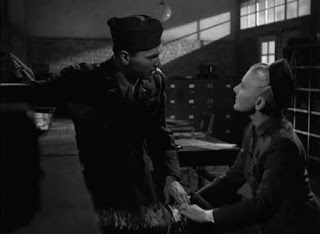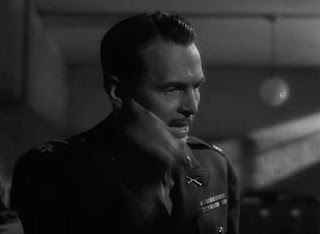The Story: Sometimes you pick out a scene...for whatever reason...and time changes it. What started out for me as a fine example of Billy Wilder's grasp of the complexity of character and his sharp writing (and another chance to showcase the genius that is Jean Arthur) turned into something a little different when viewed through the lens of recent events, as we continue with the seemingly never-ending evolution from ape to man.
The scene has always seemed creepy to me—"rapey" is the term I've been using the last few years as I've been looking at older movies (and more than a few new ones)—in the "movie" version of the affairs between men and women. What might have been intended—and previously seen—as cinema romance, now comes across as aggressive and devious. It is no excuse that this scene from Billy Wilder's A Foreign Affair is, purposely, a bit of both.
Sexual harassment in Hollywood has been in the news lately (were any of us surprised? Probably only if you were male...or incredibly naive). But the evidence has always been there. Hell, it's even in the product, part and parcel of Hollywood's propensity of making melodrama out of drama (in as few frames of film as possible), and thereby influencing our behavior by its example. Do any of us see the romance of movies as real? Probably, whether we wish to admit it or not.
Take A Foreign Affair, Billy Wilder's post-war burnt-at-the-lace valentine to his country of origin (he fled in the early days of the Nazi gleichschaltung), and an attempt to educate Americans on Marshall's occupation/rebuilding efforts, with a small injection of Hollywood funds as aid, and a melancholy rumination of a country in ruin, physically and morally (at one point, over shots of the crumbling husk that was Berlin, the soundtrack plays "Isn't It Romantic?").
Here, a straight-laced congressperson goes all weak-kneed over the manipulations of her military escort, who is only attempting to seduce her while trying to derail her efforts investigating his lover, a former Nazi collaborator (who has never lost her zeal for better living by charming whichever side is winning). She's duplicitous and he is her perfect match. He knows he's doing wrong playing around with a Nazi chanteusse, but can't help himself and to keep her...and him...from being found out, he'll resort to any blackmail, the snake.
This one's tough to watch with more modern sensibilities—in its way, it is its own little version of immoral capitulation in the guise of light entertainment, and the way the film ends? Well, it may seem all rosy at the fade-out, but after the light's come up? After the movie ends? Things can't end well. But, then, Wilder was just starting to come into his blackest noir phase with Sunset Boulevard and Ace in the Hole on their way (to be followed by his comedy in a POW camp, Stalag 17). He would still have a moral center to his work, but he would tread in dark alleys that even his mentor, Ernst Lubitsch would not enter. Even when producing the most piquant of wines it will eventually turn to vinegar.
The Set-Up: Post-war Germany. The SECOND post-war Germany. A congressional delegation has flown to Berlin to investigate the morale and the morals of the military force occupying the country and to make sure tax-money is being well spent, efficiently and not being squandered (obviously this takes place in the past century, not this one). This is why they fly there in person, spending tax-payer's dollars, to make sure tax-dollars are not being squandered (couldn't they have sent cables?). Congresswoman Phoebe Frost (Jean Arthur) is shocked to learn that a former Nazi hanger-on, Erika von Schluetow (Marlene Dietrich) is making a much-better-than-living wage than her job as a saloon singer might rake in; she suspects there may be some collusion between one of the occupying force and this notorious femme fasciste. And in a case of not seeing the forest for the trees, she does not know that the captain assigned to accompany her investigation, Captain John Pringle (John Lund), is the one who has been colluding with Fraulein von Schluetow...and colluding with her practically every night.
Action.
FROST: Schluetow, Schluetow.
S...S...S... S, S, S, S, S, S...
SCH to ST. This is where it would be.
PRINGLE: If it is at all, but I don't think it is.
FROST: Well, let's make good and sure.
PRINGLE: Sure.
FROST: Come on, open it, open it.
PRINGLE: Schlage, Schlangenberg, Schlagenspitz, Schlitz...
PRINGLE: Seems that some of them never got to Milwaukee.
PRINGLE: Schliemann, Schlissel, Schluetow...
FROST: There, there, there.
PRINGLE: Here's the Schluetows.
Anton, Emil, Fritz, Gottfried, Waldemar...
PRINGLE: No Erika.
FROST: No Erika.
PRINGLE: Told you so. Gone to Nuremberg.
Gone to Nuremberg.
PRINGLE: C'mon I'll take you back to your billet.
FROST: Erika VON Schluetow.
PRINGLE: Yes?
FROST: Von! It's under von.
PRINGLE: Oh, no.
FROST: Well, it would be like O'Brien. You wouldn't look under B, you'd look under O.
PRINGLE: All right, let's look under O.
FROST: Under V.
PRINGLE: V as in "vindictive.
FROST: What was that, Captain?
PRINGLE: I pity anybody who has you on his trail.
FROST: You pity a man who's consorting with a notorious Nazi?
(Von Resnicek, von Reudesheim...)
PRINGLE: Did it occur to you there might be extenuating circumstances?
FROST: I expect any man who's over here wearing his country's uniform...
PRINGLE: Oh, that one.
You expect him to be an ambassador.
PRINGLE: A salesman of goodwill. You want him to stand there on the blackened rubble of what used to be the corner of what used to be a street with an open sample case of assorted freedoms...
PRINGLE: ...waving the flag and giving out with the Bill of Rights. Well, that's not the way it works.
FROST: ...von Salm, von Salzburg, von...
PRINGLE: Suppose you stop for a moment and ask yourself how come he skidded off the road?
FROST: I'll tell you how. No moral brakes.
PRINGLE: That's it, going too fast.
Only during the war, he couldn't go fast enough for ya. "Get on that beachhead, get through those tank traps, get across the Rhine. Step on it, step on it!"
PRINGLE: Faster, a hundred miles an hour, 24 hours a day, through burning towns and down smashed autobahnen.
PRINGLE: Then one day the war is over. You expect him to jam on those brakes and stop like that.
Well, everybody can't stop like that! Sometimes you skid quite a piece, sometimes you go into a spin and smash into a wall or a tree and bash your fenders and scrape those fine shiny ideals
PRINGLE: ...that you brought from home.
FROST: It's about time such wrecks were hauled back into a garage. Anyone who forgets he's an American...
PRINGLE: Don't you forget that he's also a human being.
What would you know about that?
FROST: Von Schlegel, von Schlittenheim...
PRINGLE: The loneliness is all stored up in him right down to his boots and it's driving him crazy.
PRINGLE: One day a pair of open-toed shoes come along.
You want him to start asking questions? Hey, what's your Party affiliation? What's your Social Security number?
FROST: Yes, I want him to ask, I want to make sure he's not doing something subversive.
PRINGLE: Are you qualified to call the pitch on this, Miss Frost? What's your life, anyway?
PRINGLE: Committees and sessions and adjournments and budget cuts and appropriations. What do you do for laughs? What do you do for tears for that matter?
FROST: For tears... for tears I cry, Captain Pringle. It may interest you to know I once cried for a man
- till my eyes were half washed out of my head.
-
PRINGLE: Not really.
FROST: I was serving on a very important subcommittee, there were five of us. One was a Southern Democrat. His convictions were as different from mine as night from day. I hated everything he stood for. I despised his politics.
FROST: But I loved him... insanely. I loved the Southern syrup in his voice. His mint julep manners. The way he'd look at me through his long thick eyelashes
FROST: ...when I was vetoing an amendment. He'd put his arm around me, just kind of lazy-like. Lean his head against my cheek. His hair had a deep wave in it.
You know what he was trying to do?
-
PRINGLE: What?
FROST: He was trying to sway my vote.
FROST: Once he drove me home from an all-night meeting, stopped his car on Earl Street.
FROST: For no reason at all, he said, except he was yearning for my lips. To tell you the truth, I was yearning for his.
FROST: But it would have meant betraying my platform and my constituents.
-
PRINGLE: What did you do, Miss Frost?
FROST: I filibustered.
PRINGLE: You what?
FROST: I just kept on talking.
The constitution, the Bill of Rights, poems, Longfellow, anything I could think of.
FROST: Von Schloss, von Schlossen,
FROST: von Schlumann, von Schlurmann, von...
-
PRINGLE: No other man since the mint julep guy?
-
FROST: No.
-
PRINGLE: No more what you call yearning?
-
FROST: No.
-
PRINGLE: Sure?
-
FROST: None of your business.
PRINGLE: Because I've been doing a little yearning ever since you stepped off that plane.
FROST: Captain Pringle!
-
FROST: Don't!
-
PRINGLE: Why not? You're not a Nazi. Don't tell me it's subversive to kiss a Republican.
FROST: I am a Congresswoman.
PRINGLE: Yeah. Now I know how I'll cast my absentee ballot come re-election.
FROST: I'm here on official business.
-
PRINGLE: This is official.
FROST: Oh! Now, listen.
Listen.
FROST: "Listen, my children, and you shall hear of the midnight ride of Paul Revere
FROST: "On the 18th of April in '75,
FROST: ...hardly a man is now alive
FROST:
Who remembers that famous day and year
FROST: "He said to his friend, 'lf the British march by land or sea from the town tonight" 'Hang a lantern aloft in the belfry arch of the North Church tower as a signal light."
FROST: Ooohhh...'One if by land and two if by sea
"
FROST: 'And I on the opposite shore shall be ready to ride and spread the alarm
"
FROST: 'Through every Middlesex village and farm
"'For the country folk to be up and to arm... '"Then he said 'Good night! ' and, with muffled oar, silent..."
FROST: Oh!
ohhhh.
PRINGLE: Now, Congresswoman, may I have the floor?
FROST: You are entirely out of order.
PRINGLE: Objection overruled.
FROST: Oh! OH!
PRINGLE: Just, er, checking up on Paul Revere.
MP: Oh, sure.
A Foreign Affair
Words by Charles Brackett, Billy Wilder, and Richard L. Breen
Pictures by Charles B. Lang and Billy Wilder
A Foreign Affair is available on DVD from Universal Entertainment.




































































































No comments:
Post a Comment